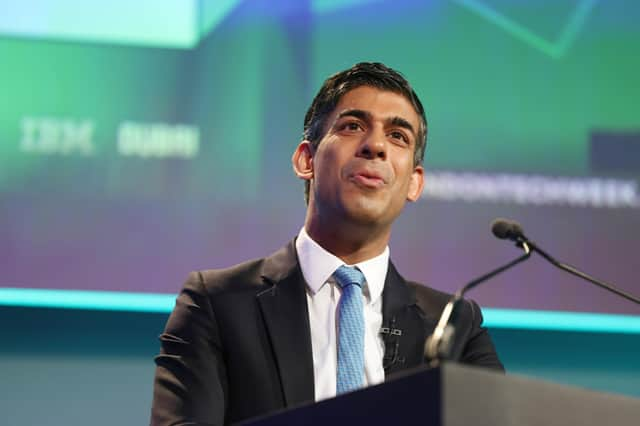Conservatives' solitary by-election victory shows that changing policy remains Rishi Sunak’s best hope – Brian Monteith


It’s easy to pile in on Rishi Sunak’s Government. When it comes to key economic policy decisions it is not difficult to argue he is making bigger mistakes than his predecessors Theresa May and Boris Johnson made. While he is undoubtedly a better communicator than May was a dancer it is not a very high bar to meet. His slick forever-smiling style bleaches-out any sincerity – and finding Johnson’s common touch is beyond him – something I expect Labour to exploit mercilessly in what will undoubtedly be a highly personalised election campaign.
Yet there is a slight tinkle of light at the end of the tunnel. The fundamental reason the Conservatives lost two seats with decent majorities is their supporters stayed at home. Secondly, in the one seat they held the central issue that decided the outcome was not high taxes and low economic growth with the real threat of a recession just like Germany’s – no, it was the single issue the proposal of London’s Labour Mayor Sadiq Khan to expand the ULEZ charges to include the periphery of London including the Uxbridge & South Ruislip constituency.
Advertisement
Hide AdAdvertisement
Hide AdThe obvious question for Conservative political strategists is how do they get those lost Tory voters to stop sitting on their hands and return to the fold? The answer in part lies in responding to the lessons of the ULEZ campaign – which requires many environmental myths to be exposed as the self-serving tosh double standards presented as facts that so many are.
In public debates about health you know when advocates of restrictions and higher taxation are weak on fact-based evidence when they turn to emotion by making appeals to think of the children. Be it products providing alcohol, nicotine, sugar and other lifestyle demons, the appeal for legal restrictions and even criminal penalties to protect children from the effects of free choice by adults is now a default position.
Similarly, when it comes to politicians extending their power and control over us the same approach is found by evoking the environment. Better still if the safety of children and the environment can be combined, thus the Mayor’s plan to extend the area of London covered by his ineffective ULEZ regulations – which fines drivers of motor vehicles with non-compliant emission levels – was based on protecting people from the threat of airborne pollution coming from vehicles with petrol and diesel combustion engines.
It might therefore surprise readers to know it is based on a big lie. An Imperial college study found the 52% of vehicle particulates come not from the tailpipe but the tyres and brakes which, being caused by friction, are worse for heavier vehicles. The greater threat therefore comes from electric cars – made far heavier because of the weight of their batteries – rather than far lighter petroleum-based cars with catalytic convertors. That’s before we get to the more general impact on the environment of making electric cars batteries or generating the additional electricity they consume (clue: it’s not all from wind power).
Sadiq Khan’s need for a larger ULEZ catchment area has nothing to do with protecting Londoners’ lungs and everything to do with finding new revenue streams for his political ambitions, extending his personal power and buffing up his environmental credentials. The constituents of Uxbridge saw through Khan and chose to back the anti-ULEZ Conservative candidate despite Rishi Sunak’s lamentable record and abandonment of past conservative principles.
Keir Starmer has apparently woken-up to the threat of a Khan-like approach causing him to snatch defeat from the jaws of victory and has asked the Mayor for “reflection” on his expansion plans. Likewise, Tory Michael Gove has suggested Conservatives should avoid making the tackling of climate change a “religious crusade”. The man whom, as a past Environment Secretary is responsible for many eye-watering Net Zero restrictions on motor vehicles, gas boilers, log burning stoves and the like, knows no shame.
Similar examples of environmental myths abound. The rush in the last decade to cultivate the Soybean to provide oil for cooking or blending with petroleum – and processing into food substitutes, including Soy Milk and Tofu – has caused widespread deforestation, especially in Brazil, the world’s largest producer. Yet it became the ingredient of choice for environmental activists.
Meanwhile, they have demonised the far more efficient Palm Oil plant for its damaging past so it now faces further international restrictions despite independent evidence its farmers have adopted sustainable farming that substantially reduced the deforestation which the Soybean still causes. Global soybean farming uses almost 30% of land used for cultivating 28% of world vegetable oil demand, whereas Palm requires less than 6% of land to provide around 40% of such oil. Still committed to Soy?
Advertisement
Hide AdAdvertisement
Hide AdBe it the humongous appetite for electric car batteries that will need to be fed with all those precious metals being mined across Africa – or the mass graves for bird-chewing wind turbine blades as they expire after 15-20 years use – many of the supposed environmental panaceas will wreak greater new harms than those they replaced. Politicians should choose carefully before imposing policies without consent.
As for that tinkle of light, if Sunak’s track record for doubling down and stubbornly persevering with higher taxes is repeated it will be extinguished long before the election campaigns kick-off. I see no likelihood of the Conservatives pulling back on environmental policies, allowing them to paint Labour’s more extreme policies as a costly exercise in futility that punishes all but the wealthiest of voters. The tinkle will be extinguished – and if it is, Sunak’s wing of the Conservative Party deserves all that it has coming to it.
Brian Monteith is a former member of the Scottish and European Parliaments and editor of ThinkScotland.org.
.
Comments
Want to join the conversation? Please or to comment on this article.
